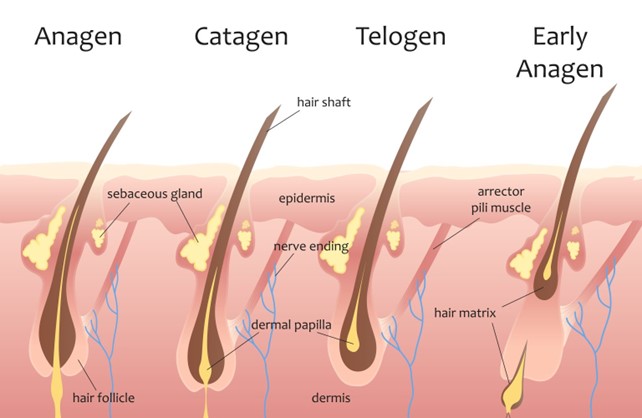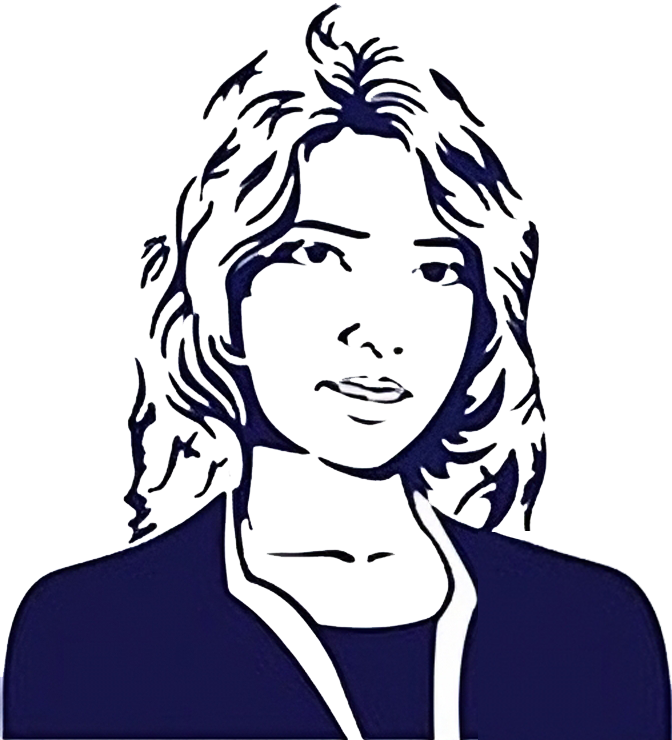Male & Female Hair Loss Treatment: Try These Methods For Hair Growth
By the age of 50, nearly half of women encounter hair thinning, affecting scalp and hair density and leading to shedding. Luscious, silky locks are often seen as a symbol of femininity and health, deeply intertwined with our self-image and societal perceptions of beauty. For many women globally, hair is not just a matter of appearance but a key part of their identity, influencing how they feel seen and understood by the world. This article aims to provide insight into female hair loss, as well as the methods to tackle it effectively.
Female Pattern Hair Loss (FPHL) vs Male Pattern Hair (MPHL)

Loss (MPHL)
Genetic Link:
- Both FPHL and MPHL result from androgenetic alopecia and are influenced by genetics.
Pattern of Hair Loss:
- FPHL typically presents as thinning at the parting line and top of the scalp, rarely leading to full baldness.
- MPHL often starts with a receding hairline and thins mainly at the top and crown, potentially forming an ‘M’ shape and possibly leading to full baldness.
The Natural Hair Growth Cycle
To understand and manage female hair loss, it’s crucial to learn about the hair growth cycle, which comprises four distinct stages: Anagen, Catagen, Telogen and Early Anagen. Each stage plays an important role in hair health and growth.

Anagen (Growth Phase)
Your hair undergoes an active growth period during the Anagen phase, which can last between two to six years. During this time, your hair cells multiply rapidly, leading to the continual lengthening of your hair.
- Duration: 2-6 years
- Key Features: Rapid cell multiplication, hair lengthening
Catagen (Transitional Phase)
The Catagen phase is a transitional period normal hair cycle that lasts approximately two to three weeks. In this stage, your hair growth slows significantly, and the hair follicle starts to shrink.
- Duration: 2-3 weeks
- Key Features: Hair growth slows, hair follicle shrinkage
Telogen (Resting Phase)
The Telogen phase is when your hair enters a resting state. Typically lasting about three months, this phase culminates in the natural shedding of hair strands. It’s normal for you to only lose between 50 to 100 hairs a day during this phase.
- Duration: 3 months
- Key Features: Hair rest, natural shedding, new hair growth initiation
Early Anagen (Initial Growth Phase)
Early Anagen marks the final stage of the hair growth cycle. Hair strands start to form from the dormant follicles and push through the scalp.
- Duration: Variable, generally lasts a few days to several weeks
- Key Features: Follicle activation, initial hair strand formation, emergence of new hair through the scalp
Male & Female Hair Loss Symptoms
- Reduction in volume or thinning: Early signs of hair loss often manifest as less fullness or finer strands.
- A gradual thinning on the scalp: Often observed as a general indicator of hair loss, this may suggest a pattern of hair thinning.
- Wider parting: If the area of your scalp where hair parts starts expanding, it’s often a hair loss indicator.
- Increase in hair shedding: Losing 50 to 100 hairs daily is normal, but more noticeable shedding is a red flag.
- Feeling of lightness in the hair or increased scalp visibility: These may be subtle hints of hair loss beginning.
- Balding: In advanced cases, bald spots or extensive hair loss areas might develop.
If one or more of the above symptoms apply to you, see a healthcare provider or trichologist for diagnosis and treatment discussion.
Benefits of Male & Female Hair Loss Treatment
- Improved Self-Esteem and Confidence: Treating hair loss can significantly boost self-image and confidence, helping women feel more comfortable and positive about their appearance.
- Increased Hair Growth: Effective treatment can stimulate hair regrowth, leading to thicker, fuller hair and a more youthful appearance.
- Healthier Scalp: Many treatments also improve scalp health, reducing issues like dryness, flaking, or itchiness, and creating a better environment for hair growth.
- Prevention of Further Hair Loss: Early and appropriate treatment can help prevent or slow down the progression of hair loss, preserving existing hair.
- Versatility in Hair Styling: With improved hair density and health, women may find they have more options for styling, allowing for greater creativity and expression through their hair.
For professional guidance on managing hair loss, we’re just one contact form away. The faster you act, the better the chances of salvaging your hair – so act now!
How Does Hairloss Treatment works? & How Much Does Hair Loss Treatment Cost?
When seeking treatment for female hair loss, it’s critical to consult with a Trichologist -specialising in treating hair loss conditions. Your journey begins with a consultation to diagnose the cause and determine the most effective treatment options.

Book an appointment with NI’S Trichology

Understand your scalp profile better after a detailed scalp analysis by NI’S Trichology

A personalized treatment will be recommended based on your scalp profile

Relax and enjoy your treatment
Before any treatment solutions can be offered, an in depth consultation needs to be carried out so that a diagnosis & personalized treatment plan can be made.
OUR CONSULTATION & TREATMENT PROCESS
What to Expect During a Consultation with a Trichologist?
Personal and Medical History
Your trichologist will ask you about your personal and medical history. Your family history of scalp and hair issues, the medications you are taking, and lifestyle factors that may affect your hair health.
Discussion of Concerns
In this step, you need to be open and share all the issues you are facing. Be prepared to provide details about when the problem started, any changes you have noticed, and any previous medications or treatments you have tried.
Physical Examinations
After that, your trichologist will examine your hair and scalp, using a magnifying tool or any other specialized equipment.
Laboratory Test
It is also possible that you may be asked for further testing to identify the underlying cause of your hair and scalp problem. The tests include blood tests, scalp scrapings, and hair samples.
Treatment
Based on their assessment, the trichologist will provide personalized treatment to your specific concern. The treatments include topical creams, supplements, and changes to your hair care routine.
PRICE & SUMMARY
| Hair Loss Treatment: A Quick Summary | |
| Treatment Time | 60- 90 minutes |
| Recommended Interval | Varies based on the specific treatment; Consultation needed for personalized advice |
| Recovery Time | Minimal downtime, but results may take 3-6 months to become visible |
| Ideal For | Both men and women experiencing hair loss issues |
| Benefits and Results | Improved hair health, slowed hair loss, and potential regrowth with consistent treatment |
| Cost | $60 for Consultation – Which is First step towards Regrowth of your hair & solve your hair loss journey.
Treatment depending on Treatment Plan will be suggested by your Trichologist after Consultation only -( $99 to $120) Costs may vary |
| Pricing | |
| Consultation – $60 | |
| Treatment Price Range – $99 to $120 | |
| Products :
Ni’S Scalp Therapy Oil ,Ni’S Scalp Therapy Scalp Serum, |
|
| Package : In Depth Consultation + In Clinic Treatment (1st session) + Products( Include Shampoo,Conditioner ,Scalp Therapy Oil , Scalp Therapy Serum) – $199. |
|
Does Hair Loss Treatment Work for Everyone?
The effectiveness of hair loss treatment can vary from person to person. Factors such as the underlying cause of hair loss, individual response to treatment, and consistency in following the prescribed regimen play a role in determining the success of the treatment.
Most Effective Hair Loss treatment
NI’S Program is the most comprehensive multi-therapeutic system for hair regrowth available today, and the full system can be used in the comfort of your own home.
Our products are non-prescription and can be shipped within 1 business day from the placement of your order.
Male & Female Hair Loss Treatment Options at NI’S Trichology
Scalp Therapy
In general, scalp therapy involves treatments designed to soothe, hydrate, and rejuvenate the scalp. It can address dandruff, psoriasis, and dermatitis, promoting healthier hair growth through massages, oils, and medicated products.
Medication
When exploring treatment options for female hair loss, you may consider a few types of medications.
Topical Immunotherapy
This treatment uses chemicals applied to the scalp to induce an allergic reaction, which can alter the immune response causing hair loss, such as in alopecia areata, encouraging hair regrowth.
Non-Invasive Hair Loss Treatments
Low-Level Laser Therapy (LLLT)
A non-invasive option to address hair loss, this method uses photons emitted from laser diodes to rejuvenate scalp tissues, which can help to stimulate hair growth.
Platelet-rich Plasma (PRP) Injections
Another form of non-invasive treatment is blood-based therapy, often referred to as Platelet-Rich Plasma (PRP) injections or therapy. Here, your own blood is used. The process involves drawing a small amount of your blood, centrifuging it to concentrate the platelets, and then injecting this enriched plasma into your scalp to encourage hair growth.
Complementary Hair Loss Treatments
These treatments may be implemented as part of a hair loss treatment regime.
Scalp Boosters and Tonics
Designed to complement and amplify the effects of initial hair treatments, these tonics deeply nourish, hydrate, and calm the scalp. Formulated to work in harmony with treatments like those offered by NI’S TRICHOLOGY, they support the journey towards achieving denser, more robust hair growth.
Hair Supplements
Hair supplements, designed for optimal hair nutrition, are formulated with vitamins, minerals, and other nutrients to support hair growth and combat hair loss, enhancing overall hair health.
Stress Reduction Therapy
A therapeutic approach aimed at mitigating stress levels to prevent or reduce stress-induced hair loss. Techniques include mindfulness, meditation, and counselling to enhance overall well-being and hair health.
Nutritional Counselling
Personalized dietary advice focused on promoting hair growth and scalp health. A nutritionist identifies deficiencies and recommends a balanced diet rich in vitamins, minerals, and proteins essential for maintaining healthy hair.
Scalp Cooling Caps
A treatment used during chemotherapy to minimize hair loss. These caps cool the scalp, reducing the amount of chemotherapy medication reaching hair follicles, thereby lessening hair fall.
Remember to follow any post-procedure care instructions provided by your hair loss specialist to maximize the benefits of the treatment.
FAQ
Sudden hair loss may stem from various causes, including stress, hormonal imbalance, thyroid disorders and anaemia. Timely intervention by a professional can help reverse hair fall.
Yes, if your hair loss is not genetic. However, we recommend seeking the help of a professional, as using the wrong shampoos, hair products and/or DIY treatments could potentially worsen your hair loss.
It depends on the cause of hair loss. The good news is, if your hair loss is due to temporary stress or hormonal changes, regrowth is likely with proper treatment. Consult a specialist for tailored advice on hair regrowth options.
No, hair loss treatments in generally cause minimal discomfort. Most procedures are non-invasive and focus on revitalising your scalp without pain.
Consider your family history and hair loss pattern. Genetic hair loss often starts at the centre parting with finer strands over time, influenced by family history. Temporary hair loss, like Telogen Effluvium, involves increased shedding across the scalp without thinning strands, and lacks a strong family link.
Certain foods in your diet may contribute to hair loss. Consider limiting the consumption of these foods:
- High-sugar foods: They can disrupt your hormone balance, potentially leading to hair shedding.
Refined carbs: Similar effects to sugar, as they can elevate blood sugar levels.
In managing hair loss, prioritise a balanced diet rich in key nutrients:
- Protein: Essential for hair growth. Include lean meats, fish, soy products.
- Iron: Found in red meat, spinach, and lentils, supports follicles.
- Zinc: Seafood and pumpkin seeds aid hair repair.
- Vitamin B: Whole grains and eggs bolster hair health.
Vitamin E and Vitamin C: Snack on nuts and fruits for antioxidants that protect scalp health.
- Use gentle, sulphate-free shampoos and conditioners
- Avoid harsh chemical treatments and heat styling tools
- Regularly moisturise and condition your hair
- Incorporate a balanced diet rich in vitamins and minerals
- Minimise stress through meditation or yoga
- Use hair growth supplements as recommended by a healthcare provider
- Protect hair from UV damage with hats or UV protectant sprays
- Trim hair regularly to prevent split ends in female.


